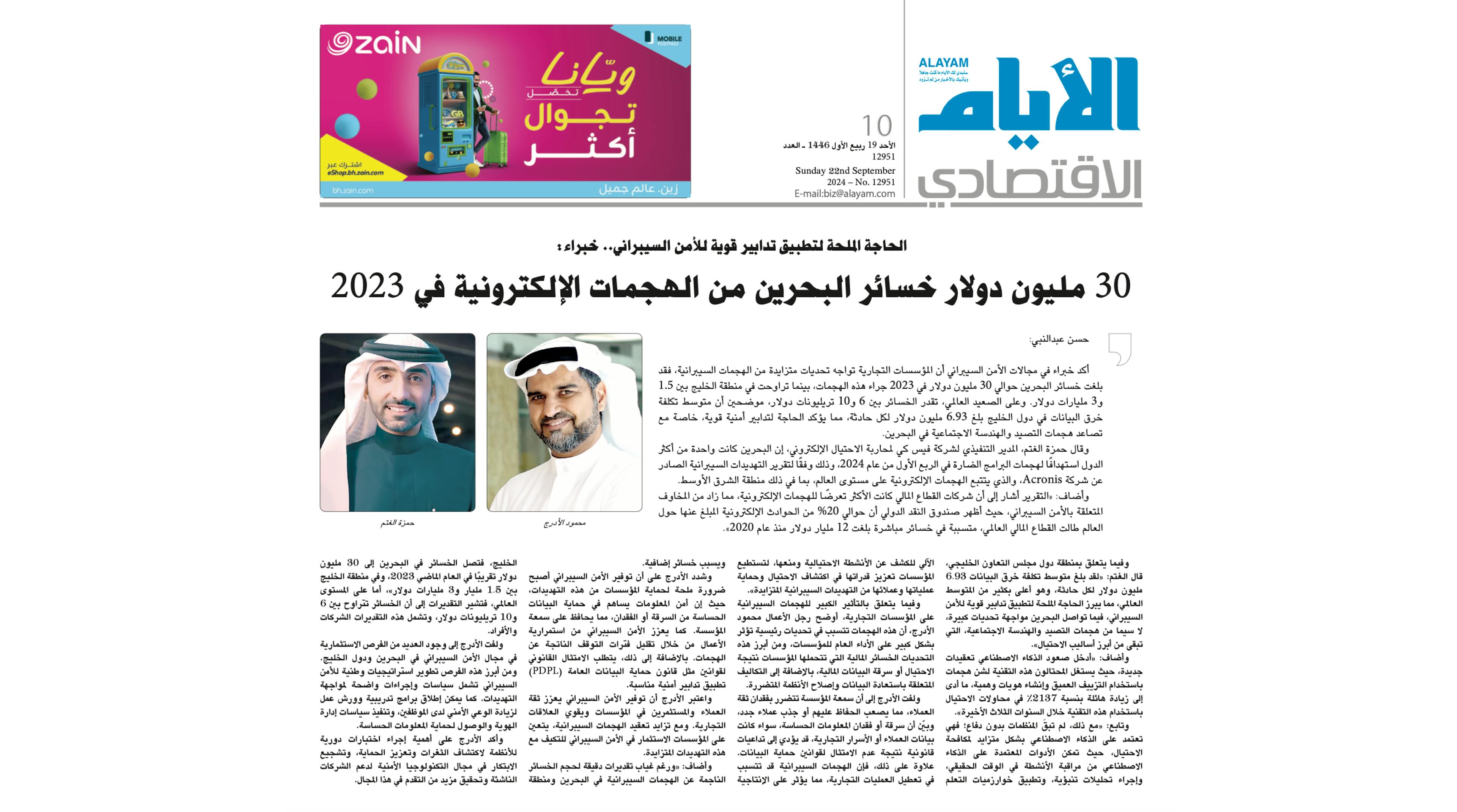Back



Sep 22, 2024
Bahrain Faces $30 Million in Losses Due to Cyberattacks
Table of Content
- Rising Cybersecurity Challenges in Bahrain and the Gulf Region
- Bahrain Among Most Targeted Countries for Malware in 2024
- Financial Sector Under Increased Threat from Cyberattacks
- Gulf Region Faces Higher Average Costs of Data Breaches
- Impact of AI on Cybercrime and Fraud
- AI: A Tool for Both Attackers and Defenders
- Business Performance Severely Affected by Cyberattacks
- Reputation and Legal Consequences of Cyberattacks
- The Growing Importance of Cybersecurity for Business Continuity
- Investing in Cybersecurity: A Strategic Necessity
- Estimating the Financial Impact of Cyberattacks
- Cybersecurity Opportunities in Bahrain and the Gulf
- Proactive Measures to Strengthen Cybersecurity
Rising Cybersecurity Challenges in Bahrain and the Gulf Region
Cybersecurity experts have confirmed that commercial institutions face increasing challenges from cyberattacks. In 2023, Bahrain incurred approximately $30 million in losses due to these attacks, while losses across the Gulf region ranged between $1.5 billion and $3 billion. Globally, losses are estimated to be between $6 and $10 trillion. The average cost of a data breach in Gulf countries has reached $6.93 million per incident, underscoring the need for robust security measures, especially with the rise of phishing and social engineering attacks in Bahrain.
Bahrain Among Most Targeted Countries for Malware in 2024
Hamza Al-Ghatam, CEO of FACEKI for Combating Cyber Fraud, stated that Bahrain was one of the most targeted countries for malware attacks in the first quarter of 2024, according to the Acronis Cyber Threat Report. This report tracks cyberattacks globally, including in the Middle East, and highlights the increased targeting of Bahrain.
Financial Sector Under Increased Threat from Cyberattacks
Al-Ghatam added, “The report indicated that companies in the financial sector were the most exposed to cyberattacks, increasing cybersecurity concerns. The International Monetary Fund (IMF) revealed that approximately 20% of reported cyber incidents globally have impacted the financial sector, resulting in direct losses of $12 billion since 2020.”
Gulf Region Faces Higher Average Costs of Data Breaches
Regarding the Gulf Cooperation Council (GCC) region, Al-Ghatam explained that the average cost of a data breach is $6.93 million per incident, significantly higher than the global average. This highlights the urgent need for stronger cybersecurity measures, as Bahrain continues to face considerable challenges, particularly from phishing and social engineering attacks, which remain prominent fraud methods.
Impact of AI on Cybercrime and Fraud
Al-Ghatam emphasized that the rise of artificial intelligence (AI) has introduced new complexities. Fraudsters are now exploiting AI technology to launch attacks using deepfakes and create fake identities, resulting in a 2137% increase in fraud attempts using these techniques over the past three years.
AI: A Tool for Both Attackers and Defenders
Despite the challenges, Al-Ghatam highlighted that organizations are not defenseless. They are increasingly relying on AI to combat fraud. AI-powered tools enable real-time monitoring, predictive analysis, and the use of machine learning algorithms to detect and prevent fraudulent activities. This strengthens institutions’ ability to detect fraud and protect their operations and customers from rising cyber threats.
Business Performance Severely Affected by Cyberattacks
Businessman Mahmood Al-Adraj explained that cyberattacks pose major challenges to the overall performance of commercial institutions. These attacks result in financial losses due to fraud or theft of financial data, as well as costs related to data recovery and system repairs.
Reputation and Legal Consequences of Cyberattacks
Al-Adraj pointed out that an institution’s reputation can suffer greatly from cyberattacks, leading to a loss of customer trust. This makes it difficult to retain existing clients or attract new ones. Additionally, the theft or loss of sensitive information, whether it’s customer data or trade secrets, can have legal consequences due to non-compliance with data protection laws. Moreover, cyberattacks can disrupt business operations, further impacting productivity and leading to additional losses.
The Growing Importance of Cybersecurity for Business Continuity
Al-Adraj stressed that providing cybersecurity has become an urgent necessity for protecting institutions from these threats. Information security helps safeguard sensitive data from theft or loss, thereby preserving an institution’s reputation. Cybersecurity also enhances business continuity by minimizing downtime caused by attacks. Legal compliance with regulations like the Personal Data Protection Law (PDPL) also requires the implementation of appropriate security measures.
Investing in Cybersecurity: A Strategic Necessity
Al-Adraj emphasized that ensuring cybersecurity boosts customer and investor confidence in institutions, strengthening business relationships. As cyberattacks become more sophisticated, institutions must invest in cybersecurity to keep pace with these growing threats.
Estimating the Financial Impact of Cyberattacks
Despite the absence of precise estimates of losses caused by cyberattacks in Bahrain and the Gulf region, Al-Adraj indicated that Bahrain’s losses amounted to approximately $30 million in 2023, while losses across the Gulf region ranged between $1.5 billion and $3 billion. Globally, losses are estimated to be between $6 and $10 trillion, impacting both companies and individuals.
Cybersecurity Opportunities in Bahrain and the Gulf
Al-Adraj noted that there are many investment opportunities in the field of cybersecurity in Bahrain and the Gulf region. One key opportunity is the development of national cybersecurity strategies that include clear policies and procedures to address threats. Additionally, training programs and workshops can be introduced to raise security awareness among employees, and identity and access management policies can be implemented to protect sensitive information.
Proactive Measures to Strengthen Cybersecurity
Al-Adraj also emphasized the importance of conducting regular system tests to detect vulnerabilities and strengthen protection. He encouraged innovation in security technology to support startups and promote progress in this field.
Credits
Leading Transformative Technology Solutions and Services Company
